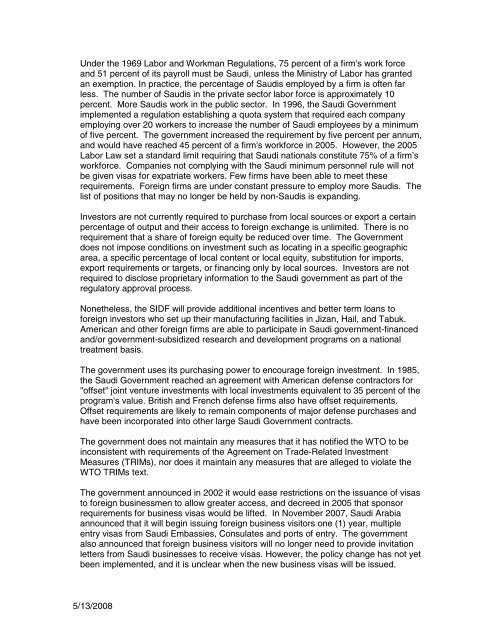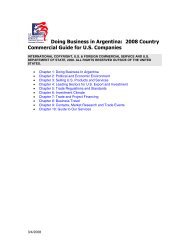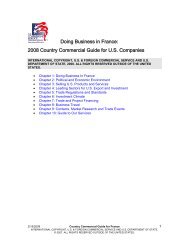Doing Business In Saudi Arabia - Bna
Doing Business In Saudi Arabia - Bna
Doing Business In Saudi Arabia - Bna
Create successful ePaper yourself
Turn your PDF publications into a flip-book with our unique Google optimized e-Paper software.
Under the 1969 Labor and Workman Regulations, 75 percent of a firm's work force<br />
and 51 percent of its payroll must be <strong>Saudi</strong>, unless the Ministry of Labor has granted<br />
an exemption. <strong>In</strong> practice, the percentage of <strong>Saudi</strong>s employed by a firm is often far<br />
less. The number of <strong>Saudi</strong>s in the private sector labor force is approximately 10<br />
percent. More <strong>Saudi</strong>s work in the public sector. <strong>In</strong> 1996, the <strong>Saudi</strong> Government<br />
implemented a regulation establishing a quota system that required each company<br />
employing over 20 workers to increase the number of <strong>Saudi</strong> employees by a minimum<br />
of five percent. The government increased the requirement by five percent per annum,<br />
and would have reached 45 percent of a firm's workforce in 2005. However, the 2005<br />
Labor Law set a standard limit requiring that <strong>Saudi</strong> nationals constitute 75% of a firm’s<br />
workforce. Companies not complying with the <strong>Saudi</strong> minimum personnel rule will not<br />
be given visas for expatriate workers. Few firms have been able to meet these<br />
requirements. Foreign firms are under constant pressure to employ more <strong>Saudi</strong>s. The<br />
list of positions that may no longer be held by non-<strong>Saudi</strong>s is expanding.<br />
<strong>In</strong>vestors are not currently required to purchase from local sources or export a certain<br />
percentage of output and their access to foreign exchange is unlimited. There is no<br />
requirement that a share of foreign equity be reduced over time. The Government<br />
does not impose conditions on investment such as locating in a specific geographic<br />
area, a specific percentage of local content or local equity, substitution for imports,<br />
export requirements or targets, or financing only by local sources. <strong>In</strong>vestors are not<br />
required to disclose proprietary information to the <strong>Saudi</strong> government as part of the<br />
regulatory approval process.<br />
Nonetheless, the SIDF will provide additional incentives and better term loans to<br />
foreign investors who set up their manufacturing facilities in Jizan, Hail, and Tabuk.<br />
American and other foreign firms are able to participate in <strong>Saudi</strong> government-financed<br />
and/or government-subsidized research and development programs on a national<br />
treatment basis.<br />
The government uses its purchasing power to encourage foreign investment. <strong>In</strong> 1985,<br />
the <strong>Saudi</strong> Government reached an agreement with American defense contractors for<br />
"offset" joint venture investments with local investments equivalent to 35 percent of the<br />
program's value. British and French defense firms also have offset requirements.<br />
Offset requirements are likely to remain components of major defense purchases and<br />
have been incorporated into other large <strong>Saudi</strong> Government contracts.<br />
The government does not maintain any measures that it has notified the WTO to be<br />
inconsistent with requirements of the Agreement on Trade-Related <strong>In</strong>vestment<br />
Measures (TRIMs), nor does it maintain any measures that are alleged to violate the<br />
WTO TRIMs text.<br />
The government announced in 2002 it would ease restrictions on the issuance of visas<br />
to foreign businessmen to allow greater access, and decreed in 2005 that sponsor<br />
requirements for business visas would be lifted. <strong>In</strong> November 2007, <strong>Saudi</strong> <strong>Arabia</strong><br />
announced that it will begin issuing foreign business visitors one (1) year, multiple<br />
entry visas from <strong>Saudi</strong> Embassies, Consulates and ports of entry. The government<br />
also announced that foreign business visitors will no longer need to provide invitation<br />
letters from <strong>Saudi</strong> businesses to receive visas. However, the policy change has not yet<br />
been implemented, and it is unclear when the new business visas will be issued.<br />
5/13/2008












